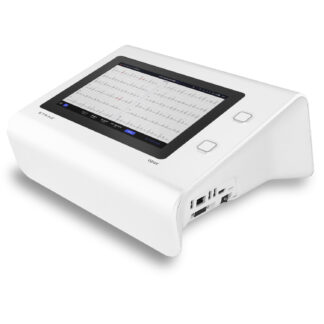Description
Opus 1 – 12-channel electrocardiograph
Opus 1 is an ultra-modern 12-channel electrocardiograph designed for the most demanding users.
The Opus 1 can be stored on its own trolley or in a carry case, since it comes complete with a 8 hour battery this makes it ideal for use at field events in mobile clinics.
The 10 ” high-resolution touch screen allows for simultaneous monitoring of all 12 leads and the high-quality printouts on 210 mm wide paper, provide a perfect diagnostic image.
It has a unique feature of changing sample levels up to 16,000 Hz guaranteeing exceptional clinical precision. It is equipped with a high-capacity hard disk drive, from which it is possible to wirelessly export test results (tests) in many formats (eg PDF, XML, SCP) to a HIS (Hospital Information System) server or CardioCLOUD (cloud storage ).
The additional space designed for a backup roll of paper allows for continuous testing. Opus 1, as a standard, provides the possibility of using the consumables ordering centre and online technical support.
A lifetime warranty is available in the Premium subscription package. The device is available in 3 colour options.
| Screen | LCD IPS 10.1 “, |
| Resolution | 1280×800 px |
| Internal memory | 100,000 examinations |
| Power supply | 100V to 250V, frequency 50 / 60Hz |
| External printer | wireless |
| Sampling | Up to 16,000 Hz |
| Export / Import | HL7, DICOM, Cloud, PDF, XML, SCP |
| Interface | WI-FI / LAN, BLUETOOTH, HDMI FULL HD, USBx3, SD card, network printers |
| Battery Capacity | Up to 8h |
| Network interference filter | 50/60 Hz |
| Muscle noice filter | 25, 35, 45 Hz |
| Isoelectric line filter | 0.15 to 1.5 Hz |
The company name String was inspired by the first ECG device that appeared in the world. The String Galvanometer was invented around 1901 by the Dutch physician Willem Einthoven. The String apparatus was the first practical electrocardiograph (ECG) and one of the first instruments capable of detecting and recording very small electric currents generated by the human heart and at the same time creating the first electrocardiograms. Einthoven received the 1924 Nobel Prize in Physiology and Medicine for his work.
If you have any questions about this product – Please “Ask Wessex”






Reviews
There are no reviews yet.